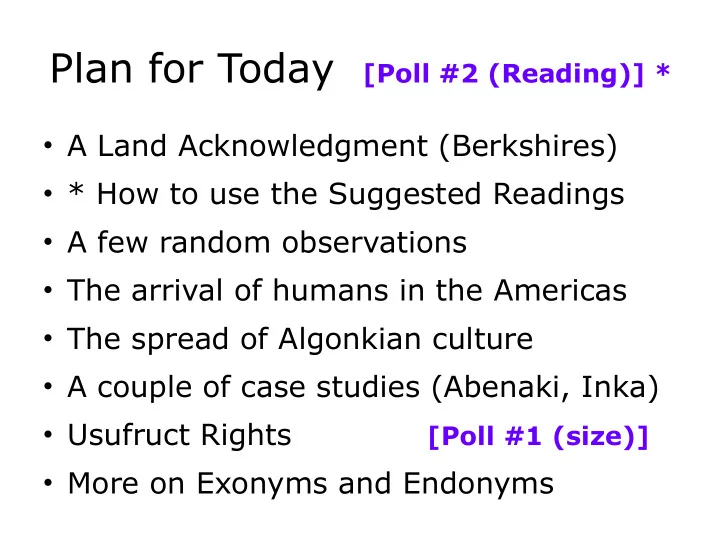

Plan for Today [Poll #2 (Reading)] * ● A Land Acknowledgment (Berkshires) ● * How to use the Suggested Readings ● A few random observations ● The arrival of humans in the Americas ● The spread of Algonkian culture ● A couple of case studies (Abenaki, Inka) ● Usufruct Rights [Poll #1 (size)] ● More on Exonyms and Endonyms
Land Acknowledgment ● Take everything with a grain of salt ● Pitawbagok (Pita + Bogw) ● Housatonic (Wassa + Aden + -ic) ● Schodack Island ● Time perspective (528 years, 1756) ● FAQ (Chapter 4 in 1491 ) page 110 ● New research: Koch, Alexander et al (2019) 8,336,817 – 7,919,976 = 416,841 328,200,000 – 311,790,000 = 16,410,000
As Time Permits (which it probably won't, so ideas for the next session...) Population Collapse and The Little Ice Age (preview) The Work of Henry Lewis Morgan Haudenosaunee “People who build a house” Hiawatha and The Peacemaker “People of the Longhouse” Ongweh'onweh = “Real Human Beings” Why is it the “ Mohawk ” Trail? “Communism in Living” and Utopian Communities Steady State Economics Is it what we need to combat Climate Change? What can we learn from Indigenous Culture?
Schodack Island (Fort Nassau) to Albany (Fort Orange) What's an Esquatak? Esquatak is an Indian name meaning "the fireplace of the nation," so called because the council-seat of the famed Mohican Indians was located in the Town of Schodack. Beside Esquatak, the Indians had villages called Potkoke, Wyomenock and others. https://esquatak.org/
$12 per year Mohican News PO Box 70 Bowler WI 54416
More Tidbits ● “Cahokia … was once the greatest population center north of the Río Grande.” p. 29 ● “… manitou , the world-suffusing spiritual power at the heart of coastal Indians' religious beliefs.” p. 41 ● New England (1616) previously called “Norumbega” 42 ● “glottochronology” p. 43 -- common Algonkian ancestor a few hundred years BC ● Hopewell culture ~2K years ago, ending ~400 AD, may have been the source of Algonkian languages pp. 43-44 ● pp. 45-49 discussion of heating methods for dwellings, diet, absence of war (beginning? of palisades) ● Pound Ridge, New York
People arrived in the Americas earlier than had been thought Laurentine Glaciation ● Our part of the “New World” was inhabited before parts of northern Europe (Poll #6) ● More of the Continental Shelf was exposed “History is written by the victors” ● Holmberg's Mistake? (Poll #3) was in the Amazon; English colonists made the same error ● Who controlled the narrative that we (of European descent) have come to know? [rhetorical question!]
Exonym versus Endonym It wasn't just the English The Europeans had great difficulty comprehending Indian naming schemes. They did not understand, for example, that individuals did not necessarily keep their birth name throughout their lives, but were often given new names to reflect their accomplishments or roles. Also, the Europeans did not fathom that groups of Indians that lived great distances apart and seemed (to them) to be unconnected could actually be part of the same nation. When, for example, Samuel de Champlain explored the gaspeguyuk (gaspé in French) peninsula, he encountered several large groups of Indians living along the river. He always asked what they called themselves, and his scribe recorded the answers. There was probably a lot of sign language and gesturing involved, because the two cultures had not had much contact, so spoken words were probably not well understood. gaspeguyuk = end of water (where fresh and salt waters mix) One of the first groups he encountered told him they were Wabenaki (pronounced ah- ben-AH-key in English, but ah-BEN-ah-key in Algonkian). A hundred miles away, he encountered another group who told him the same thing. “Impossible!” he said, “I just met some people down the river who told me that!” “8h8h (Yes),” they said, “nimicamog (those are my people)” And so Champlain called them the Micmac. There are many other examples.
Where are the Wabenaki homelands? What does the name mean?
Maliseet means “slow speaker”
Some random gleanings “L” and “R” languages/dialects Western Abenaki dog = alemos
Where are the Wabenaki homelands? What does the name mean? Much of my information here comes from a talk by Ron Paul (Penobscot) at UMass on February 26, 2020 In Abenaki (and, by extension, Algonkian) culture, the creation of all life was done by the sun and the earth, with the sun as the father and the earth as the mother. The dawn of a new day is an important event, because every day is a “do-over” – you get to correct the mistakes of the past and to launch new and exciting ventures. ckuwi = come this way ckuwap = look this way ckuwapon = the sun is looking our way (dawn)
ckuwi = come this way ckuwap = look this way ckuwapon(ah) = the sun is looking our way (dawn) ki = earth, soil, land kik = on the ground, on the land kiyig = the people who live on the land the suffixes ik ak uk ok are all locatives or indicative of people the suffix abe (ah-bay) = people ak is also a suffix indicating plural the “g” and “k” sounds are somewhat interchangeable, and speaker- dependent ckuwaponahkik = the land where the sun first looks our way ckuwaponahkiyig = the people who live on the land where the sun first looks our way (people of the dawnland) ckuwaponahkiyig = wa ben aki (singular) waben ak iak (plural)
Western Abenaki Southern Border west of the Kwenitegok (kweni = long, tekw = river, ok = to) seems to be the Pokw8mtekw (Pocumtuck; pokw8m = very narrow), now the Deerfield River Time for Poll #7 (Turtle Island)
Recommend
More recommend